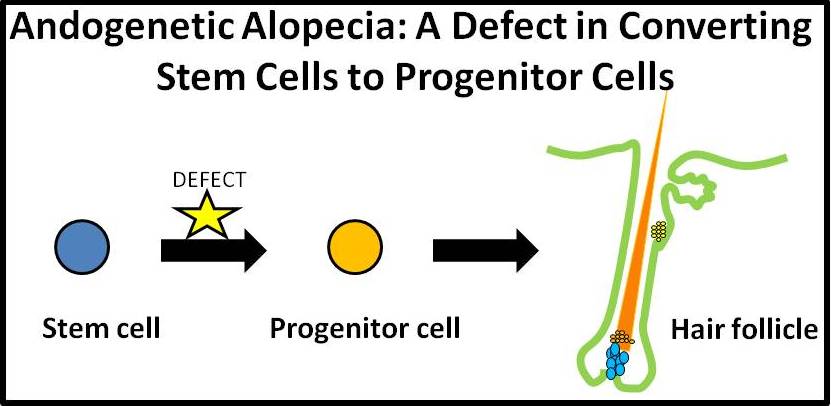What's New in the World of Hair Research? Stem Cells.
Androgenetic alopecia: Are the stem cells still present or are they all gone?
Androgenetic alopecia is common in the population. By age 50, about 50 % of men and 30 % of women will have androgenetic alopecia. Men often develop recession in the temples and an expanding balding area in the crown. Women with androgenetic alopecia develop hair thinning in the central scalp.
Over the last 10-15 years, research in hair diseases has focused a lot on “stem cells.” Stem cells are cells that have the ability to give rise to new cells types. Hair follicle stems cells have the ability to give rise to “progenitor cells”, which in turn can produce a new hair follicle.
Until recently, it was unknown whether individuals with androgenetic alopecia retain stem cells in the progressively thinning hair follicles. However, researchers at the University of Pennsylvania lead by Dr. George Cotsarelis showed that hair follicles from patients with androgenetic alopecia do retain stem cells. For reasons that are still unclear, these stem cells are less able to covert into progenitor cells.
To perform the study the researchers studied 54 men aged 40-65. Hair follicles from balding areas were compared to hair follicles from non-balding areas. The bald and non bald areas were found to contain similar levels of stem cells. However, the balding areas had fewer progenitor cells.
It is not known if the results would be similar in women, because the study population consisted only of men. However, one can speculate that they likely would be. This study is extremely exciting. If hair follicle stem cells in androgenetic alopecia can be coaxed or convinced to convert into progenitor cells, it may be possible to reverse the balding process. More research is needed to determine how do to that.
Garza et al. Bald scalp in men with androgenetic alopecia retains hair follicle stem cells but lacks CD200-rich and CD34 positive hair follicle progenitor cells. J Clin Invest 2011; 121: 613-622.
This article was written by Dr. Jeff Donovan, a Canadian and US board certified dermatologist specializing exclusively in hair loss.

